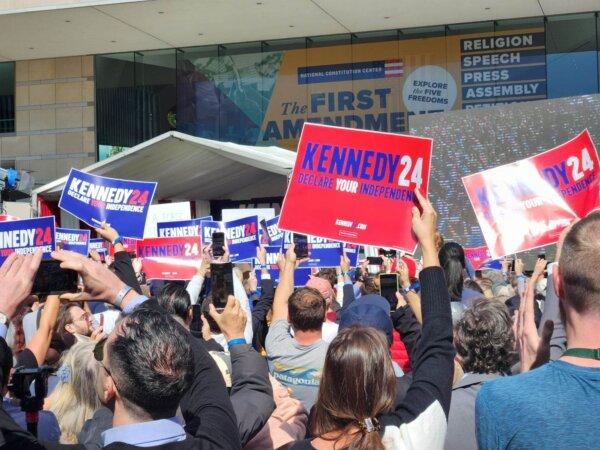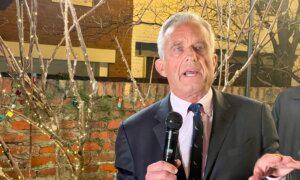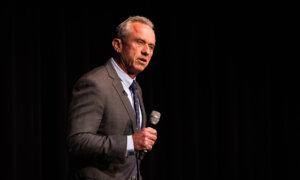The measure would substantially raise the number of signatures that independent candidates must submit to appear on a statewide ballot in Kansas.
If a Kansas bill that would substantially impact statewide ballot access for independents passes the state Senate and is signed by Democrat Gov. Laura Kelly, Robert F. Kennedy Jr.’s campaign said it will file legal action.
The Kansas House passed HB 2516 by a 68-52 vote on Feb. 22. The measure now heads to the Senate. If passed and signed by Ms. Kelly, the bill will raise the number of signatures that independent candidates must submit from 5,000 to 2 percent of the last gubernatorial vote, which is around 21,000.
The proposed legislation would also eliminate an independent candidate’s ability to pay a filing fee instead of completing the signature requirement.
“These are the kinds of dirty politics that has [sic] Robert F. Kennedy Jr. running for office in the first place,” a statement from Mr. Kennedy’s campaign said on Feb. 23. “If this stands, our campaign will be forced once again (like we did in Utah) to bring legal action—legal action that costs dollars and cents.”
Since announcing that he would run as an independent instead of a Democrat last October, Mr. Kennedy has frequently lamented the challenges that an independent candidate faces compared to Democrats and Republicans, who have no ballot access constraints.
“Nearly all of our budget is devoted to achieving ballot access in the 50 states and D.C. so we can end these political stunts aimed at preserving power between two and only two political parties,” the campaign statement added.
Mr. Kennedy has said that it will take around $15 million to get on the ballot in all 50 states and the District of Columbia.
Mr. Kennedy has expressed confidence that he will appear on the ballot in every state and the nation’s capital. He told The Epoch Times that his campaign is supported by a “grassroots army” and he is aiming to get 60 percent more signatures than needed in every state to “provide a cushion.”
He said there are “a handful of states that make it very, very difficult. New York is one. California is another. Texas is another. We’ll likely have to do some litigation, and we will have litigation against us,” Mr. Kennedy said.
In January, Mr. Kennedy’s campaign filed paperwork in six states to create its own political party.
The move was made in those states that require fewer voter signatures for candidates affiliated with a party to get on the ballot.
In five states—California, Delaware, Hawaii, Mississippi, and North Carolina—Mr. Kennedy’s campaign formed the “We the People” party. In the Lone Star State, Mr. Kennedy has registered the “Texas Independent Party.”
Three States and Counting

Mr. Kennedy is now on the 2024 presidential general election ballot in three states, including Hawaii.
He announced in January that he met the signature requirement to appear on Utah’s 2024 general election presidential ballot. Utah was the first state where Mr. Kennedy submitted signatures.
Utah had presented the first deadline until Lt. Gov. Deidre Henderson, a Republican, announced that she would extend the deadline for independent presidential candidates to gain ballot access to March 5.
Mr. Kennedy had filed a lawsuit against Utah officials on Dec. 4, 2023, citing an “unconstitutional early filing deadline” that prevented ballot access for independent presidential candidates.
Utah’s Jan. 8 deadline had required independent presidential candidates to collect and verify 1,000 signatures from qualified voters.
Mr. Kennedy argued in the lawsuit that “the current deadline is the earliest deadline ever sought to be imposed on independent presidential candidates in the modern era. No federal court has ever upheld a January deadline [for independent presidential candidates].”
He also collected more than 5,000 signatures in one day to meet guidelines for New Hampshire ballot access.
Splitting the Vote
Kansas Libertarian Party political director Matt Clark told the Kansas Reflector that the “bill exists because Republicans believe their candidate would have won the gubernatorial race in 2018 and 2022 if it weren’t for an independent candidate running in each of those elections” and splitting their vote, making way for the Democrat candidate to win.
Ms. Kelly has won consecutive elections against GOP gubernatorial nominees Kris Koblach and Derek Schmidt.
In 2018, Ms. Kelly gained 48 percent of the vote compared to 42.9 percent for Mr. Kobach, 6.5 percent for independent Greg Orman, 1.9 percent for Libertarian Jeff Caldwell, and 0.6 percent for independent Rick Kloos.
Candidates outside of the Democrat and Republican parties combined for 9 percent of the vote.
Ms. Kelly was re-elected in 2022 in a four-candidate general election. She defeated Mr. Schmidt, 49.5 percent to 47.3 percent. Independent Dennis Pyle, a conservative state senator, secured 2 percent, while Libertarian Seth Cordell received 1.1 percent.
Kansas State Rep. Les Mason, a Republican, told the Wichita Eagle that the bill’s objective is “to make sure that the independent candidate is serious and credible, not motivated by ego or personal vendetta or just wanting to regale their grandkids someday with tales of how they ran for governor.”
The measure would impact independent presidential candidates, too.
Richard Winger is a ballot access expert and editor of Ballot Access News. He wrote on Feb. 22, “Kansas is in the Tenth Circuit. In 1984, the Tenth Circuit ruled in a Wyoming case that states cannot increase ballot access barriers in an election year and expect the new requirement to take effect immediately. The Kansas bill, if passed, will be in violation of that ruling, because it takes effect this year.”
‘Two-Party Duopoly’
Earlier this year, Mr. Kennedy noted that legal challenges from Democrats and Republicans intent on keeping him off the ballot are possible. There are processes to challenge signatures after they’ve been submitted to election offices in multiple states. He also said he expected obstacles to getting on the ballot in many states, and that he would have to take legal action.
Ballot access laws for independent and third-party candidates are “among the worst forms of voter suppression in America today,” Mr. Kennedy said, adding that state officials should work together to “streamline and standardize ballot access procedures.”
Ballot access restrictions “artificially prop up the two-party duopoly,” Mr. Kennedy explained, noting that a Gallup poll conducted in September 2023 showed that 63 percent of American adults agree that “the Republican and Democratic parties do such a poor job of representing the American people that another choice is needed.”
Original News Source Link – Epoch Times
Running For Office? Conservative Campaign Consulting – Election Day Strategies!


